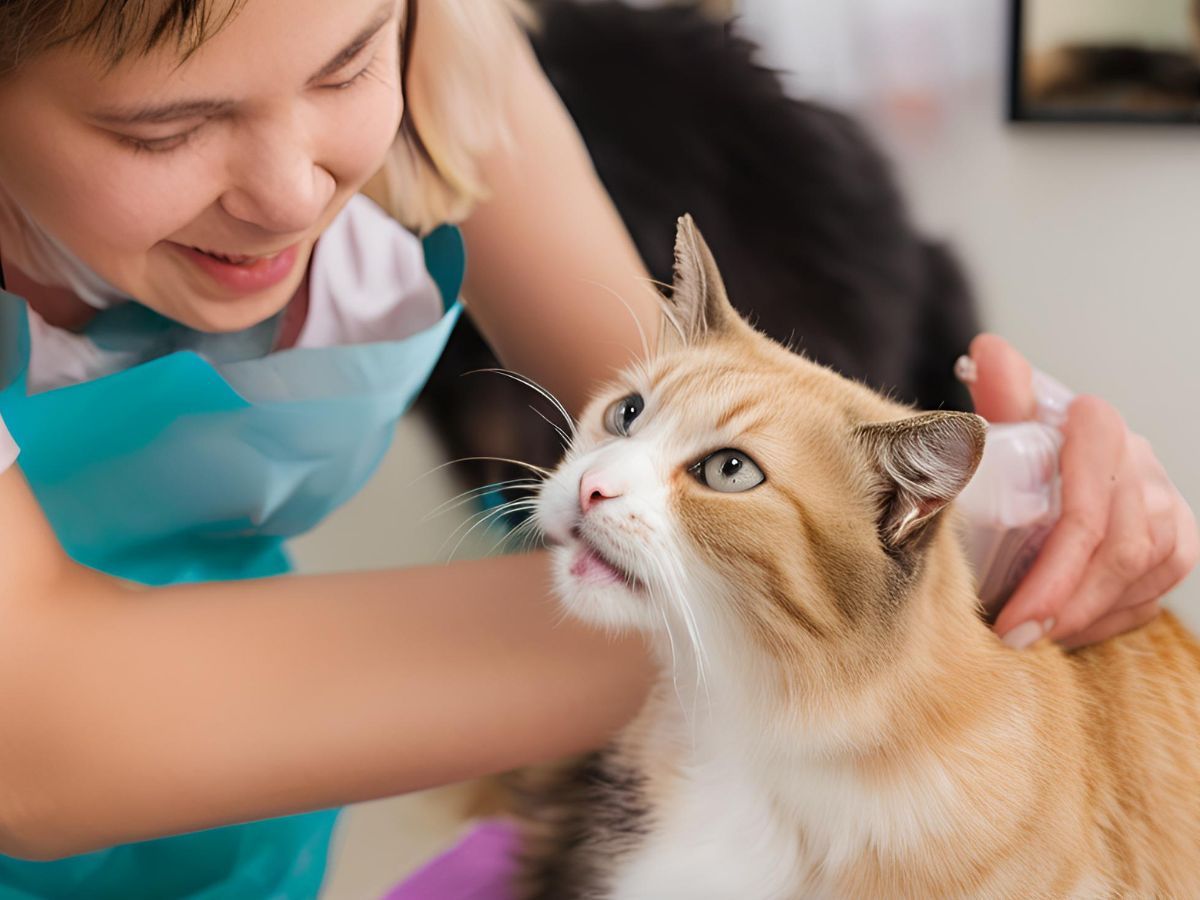What about Cat Behavior After Vaccination. Many cats act strangely following their vaccinations and this is normal. Although most of these side effects are generally mild and resolve in a few days, there may be certain extreme cases where an animal might have one of the following more serious reactions that require immediate medical attention — such as developing a tumor at or near the injection site (a.k.a. prophylaxis) or coming down with life-threatening symptoms related to inflammation around this area too.
If we are talking about cats, then the risk is very often minimal as they tend not to get affected by exposure. Most vaccines will elicit a response, on average 1-10 cats out of every 1000. Maybe this is what a cat should look like if the side effects of vaccines have not disappeared after 7 days If your cat acts weirdly after vaccination, you must call to consult with your vet.
Vaccinations are important to protect your cat from numerous fatal diseases. But it is also normal for your cat to not act quite the same after they get their shots. This article discusses some likely causes of these altered behaviors, and what you can expect after your cat’s vaccine. Knowing these things can help ensure your cat is and remains in good health, or give you hints as to ways that may be able to assist with any issues.
Cat Behavior After Vaccination
The fact is, it´s normal that dogs as well ass cats present mild common side effects after they are vaccinated. If your cat has received the vaccine, then he will display some abnormalities within 48 hours. Although most side effects of cat vaccines are mild, you should watch for any life-threatening reactions.
While side effects can include fatigue and a low-grade fever, the studies have shown that serious adverse events like prophylaxis are both few in number and less severe. Generally speaking you will find that pets, both dogs and cats, experience no adverse side-effects following multiple vaccinations. As always, if you have concerns about your cat or dog get in touch with your vet as soon as possible.
Common Cat Vaccine Side Effects
Most cats experience mild side effects after vaccination. These reactions are typically harmless and resolve within a few days. Understanding these potential side effects can help you better care for your cat post-vaccination:
Lethargy After Vaccine:
It’s common for cats to be less active or appear tired after getting vaccinated. This lethargy usually lasts for a day or two as their body adjusts to the vaccine.
Vomiting and Diarrhea:
Some cats may experience gastrointestinal upset, including vomiting or diarrhea, after vaccination. If these symptoms persist, it’s important to consult your veterinarian.
Facial Swelling and Hives:
Allergic reactions to vaccines can lead to facial swelling, hives (urticaria), or general itching. These symptoms usually appear within a few hours after the vaccine is administered.
Respiratory Distress:
In rare cases, a severe allergic reaction can cause respiratory distress, which requires immediate veterinary attention.
Shock:
Although extremely rare, prophylactic shock can occur, leading to severe illness or collapse.
What to Expect in Cat Behavior After Vaccinations ?
The general side effects of livestock’s include the uplifting and uplifting of the needle, which permeates the skin, but these symptoms are soft and pets are often like normal self. In some cases, it may take your pet up to 48 hours for the vaccine to take effect. Side effects of intracranial vaccines include sneezing and runny nose, but these are usually not as dangerous as the illnesses the vaccine prevents. The risk of a serious reaction in a vaccinated dog or cat is very low. However, if your small or extra-small cat shows signs of a serious reaction, it is very important to seek veterinary advice or visit an emergency veterinary clinic. It is important to note that while earlier vaccines may have had different effects, newer vaccines are designed to be safe and effective.
Knowing what to expect after your cat’s vaccination can help you monitor their behavior and health more effectively. Common post-vaccination reactions include:
Soreness at the Injection Site:
Your cat might feel some discomfort at the injection site. This can cause them to limp or avoid being touched in that area.
Mild Fever:
A slight fever is a normal immune response and typically resolves within a day.
Behavioral Changes:
Your cat might seem more withdrawn or irritable, but these changes should be temporary.
Delayed Vaccine Reaction in Cats
Delayed reactions to vaccines are rare in cats, but cats are vaccinated against a wide variety of diseases. In most cases, they experience mild side effects such as swelling or a lump from intracranial vaccines, but serious side effects are rare. The risk of your pet having a severe allergic reaction is very low.
Puppies and kittens may show signs of inflammation soon after vaccination, but in cats, signs of more severe side effects from intracranial vaccines are rare. On the other hand, a severe reaction in a dog can have more serious consequences, so monitoring is important. Vaccination comes in various forms, such as drops or sprays, and side effects usually go away within a few days. While the vaccination process is generally safe, pet owners should remain vigilant for any serious reactions to the vaccine.
How Can I Make My Cat Feel Better After Shots?
Once your cat has been vaccinated, it is normal for them to have a serious reaction, but severe reactions that require immediate medical attention are rare. A bump or lump at the injection site is common, but usually goes away within a few days. The risk of reaction that requires immediate medical care is low because the side effects of the vaccine have little time. The vaccine is an important part of the cats and the discomfort you receive from the vaccine, generally temporary, and will be in good mood for a few days.
There are several ways you can help your cat recover after receiving a vaccine:
Provide a Comfortable Space:
Ensure your cat has a quiet and comfortable place to rest. Avoid unnecessary handling or stress during this time.
Monitor Their Health:
Keep a close eye on your cat for any signs of severe reactions. If you notice persistent vomiting, diarrhea, or difficulty breathing, contact your veterinarian immediately.
Offer Gentle Care:
If your cat is sore at the injection site, avoid touching that area. A gentle, soothing touch elsewhere can help reassure them.
Ensure Hydration:
Make sure your cat is drinking enough water, as hydration is crucial, especially if they have experienced vomiting or diarrhea.
Why Is My Cat Crying After Vaccine?
Your cat might cry after a vaccine due to discomfort or mild pain at the injection site. This is a normal reaction and should subside within a few hours. If the crying continues or is accompanied by other symptoms like swelling or difficulty breathing, it’s important to contact your veterinarian for advice.
How Long Do Cat Vaccine Side Effects Last?
The majority of cats who receive vaccinations, such as those for rabies and feline distemper, will have mild side effects. These responses frequently involve fatigue and slight fever.
Usually, cats experience temporary side effects from vaccines that only last a few days. Rare verious side effects may happen and need to be closely observed.
The majority of side effects caused by cat vaccinations typically persist for a period of 24 to 48 hours. If your cat still shows signs after 48 hours, it’s crucial to seek advice from your vet. Extended side effects may suggest a more severe problem.
How to Make a Cat Feel Better After Vaccines?
To help your cat feel better after receiving vaccines, provide extra comfort and care. Ensure they have a peaceful environment and monitor their eating and drinking habits. If your cat seems uncomfortable or in pain, you can ask your veterinarian about safe pain relief options.
Can Kittens Get Sick After Vaccinations?
While vaccinations are crucial for preventing severe diseases, kittens can sometimes develop mild symptoms after their shots. These symptoms might include lethargy, fever, or mild gastrointestinal upset. These reactions are usually short-lived and not a cause for concern unless they persist.
Kitten Fever After Vaccination
Kittens may develop a mild fever after their shots. This is a normal response and typically resolves within 24 hours. Ensure your kitten stays hydrated and rests until they feel better.
Conclusion
Understanding why your cat might act weird after getting vaccines can help you provide the best care during their recovery. While most cats experience only mild, temporary side effects, it’s essential to monitor your pet closely and consult your vet if you notice any worrying symptoms. By taking the right steps, you can help your cat feel better and ensure they remain healthy and protected against serious diseases.
FAQs about Cat Behavior After Vaccination
Do Cats Act Different After Vaccinations?
Yes, it’s common for cats to act differently after receiving vaccines. They might be more lethargic, less interested in food, or slightly irritable. These changes are usually temporary and part of the body’s normal response to the vaccine.
Do Indoor Cats Really Need Vaccines?
Even indoor cats need vaccines to protect them from diseases they might be exposed to, such as if they escape outdoors or come into contact with new animals. Vaccinations also protect against diseases that can be transmitted in other ways, like through contaminated objects or human carriers.
How Long Can Cats Go Without Vaccinations?
It’s important to follow your veterinarian’s recommended vaccination schedule to keep your cat protected. Skipping or delaying vaccines can leave your cat vulnerable to serious diseases. If you’re unsure of your cat’s vaccination status, consult with your veterinarian to create a catch-up schedule.
When Should You Start Vaccinating Your Kitten?
Kittens typically receive their first vaccinations at around six to eight weeks of age. These initial shots are crucial for building immunity and protecting them against common feline diseases. Follow-up boosters are necessary to ensure lasting protection.

